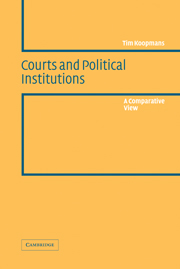Book contents
- Frontmatter
- Contents
- Preface
- Table of cases
- List of abbreviations
- 1 Introduction
- 2 The Sovereignty of Parliament
- 3 Judicial review of legislation
- 4 The growth of judicial power
- 5 The limits of judicial review
- 6 The legality of administrative action
- 7 Courts and governments
- 8 Courts and individual rights
- 9 Techniques of judicial protection
- 10 A glance at the future
- Select bibliography
- Index
5 - The limits of judicial review
Published online by Cambridge University Press: 26 February 2010
- Frontmatter
- Contents
- Preface
- Table of cases
- List of abbreviations
- 1 Introduction
- 2 The Sovereignty of Parliament
- 3 Judicial review of legislation
- 4 The growth of judicial power
- 5 The limits of judicial review
- 6 The legality of administrative action
- 7 Courts and governments
- 8 Courts and individual rights
- 9 Techniques of judicial protection
- 10 A glance at the future
- Select bibliography
- Index
Summary
The political question
Now and then courts refuse to examine a case because they feel it should be dealt with by the political institutions. The US Supreme Court describes such cases as ‘non-justiciable’. That view is not directly founded on the text of the American Constitution, which rather implies that the judicial power extends to ‘all’ cases and controversies. The nature of the case may be such, however, that judicial intervention would not be appropriate.
An early example of this conception is the interpretation of the ‘guarantee clause’ of the Constitution. It provides that the United States shall ‘guarantee to every state in this Union a republican form of government’ and protect each of them against invasion. In 1842, when there were two rival governments in the state of Rhode Island, the courts refused to determine which of the two was the lawful government of the state. The US Supreme Court finally held that action by the President of the United States had shown that the decision had been committed to other branches of the federal government. In 1912, the Supreme Court refused to adjudicate a claim that the initiative and referendum procedure instituted by the state of Oregon violated the guarantee clause. Justiciability of the clause would involve an ‘inconceivable expansion of judicial power’, said the Court, ‘and the ruinous destruction of legislative authority in matters purely political’. Strong language indeed.
- Type
- Chapter
- Information
- Courts and Political InstitutionsA Comparative View, pp. 98 - 128Publisher: Cambridge University PressPrint publication year: 2003



